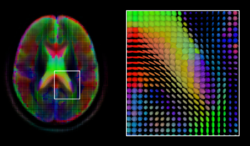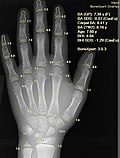
Back معلوماتية صحية Arabic Медицинска информатика Bulgarian Medicinska informatika BS Lékařská informatika Czech Medizinische Informatik German Ιατρικό λογισμικό Greek Informática biomédica Spanish Meditsiiniinfomaatika Estonian انفورماتیک پزشکی Persian Informatique médicale French
| Medical informatics introduces information processing concepts and machinery to the domain of medicine. |
Health informatics combines communications, information technology (IT), and health care to enhance patient care and is at the forefront of the medical technological revolution.[1] It can be viewed as a branch of engineering and applied science.
The health domain provides an extremely wide variety of problems that can be tackled using computational techniques.[2]
Health informatics is a spectrum of multidisciplinary fields that includes study of the design, development, and application of computational innovations to improve health care.[3] The disciplines involved combine healthcare fields with computing fields, in particular computer engineering, software engineering, information engineering, bioinformatics, bio-inspired computing, theoretical computer science, information systems, data science, information technology, autonomic computing, and behavior informatics.[4]
In the healthcare industry, health informatics has provided such technological solutions as telemedicine, surgical robots, electronic health records (EHR), Picture Archiving and Communication Systems (PACS), and decision support, artificial intelligence, and machine learning innovations including IBM's Watson and Google's DeepMind platform.
In academic institutions, health informatics includes research focuses on applications of artificial intelligence in healthcare and designing medical devices based on embedded systems.[2] In some countries the term informatics is also used in the context of applying library science to data management in hospitals where it aims to develop methods and technologies for the acquisition, processing, and study of patient data,[5] An umbrella term of biomedical informatics has been proposed.[6]
- ^ Mohd J, Abid H, Ravi P (17 December 2023). "Health informatics to enhance the healthcare industry's culture: An extensive analysis of its features, contributions, applications and limitations". Informatics and Health. 1 (2): 123–148. doi:10.1016/j.infoh.2024.05.001.
- ^ a b Sami HR, Reynolds NC (7 May 2021). Talavera F, Busis NA, Lorenzo N (eds.). "Medical informatics in neurology: What Is Medical Informatics?, Signal Processing, Image Processing". EMedicine: Medscape's Continually Updated Clinical Reference.
- ^ Nadri H, Rahimi B, Timpka T, Sedghi S (August 2017). "The Top 100 Articles in the Medical Informatics: a Bibliometric Analysis". Journal of Medical Systems. 41 (10): 150. doi:10.1007/s10916-017-0794-4. PMID 28825158. S2CID 7309349.
- ^ Shortliffe EH, Cimino JJ, eds. (2014). Biomedical Informatics: Computer Applications in Health Care and Biomedicine (4th ed.). London: Springer-Verlag. doi:10.1007/978-1-4471-4474-8. ISBN 978-1-4471-4473-1.
- ^ Imhoff, M (2002). "Health Informatics". Evaluating Critical Care. pp. 255–256. doi:10.1007/978-3-642-56719-3_18. ISBN 978-3-540-42606-6.
- ^ Shortliffe, Edward Hance; Cimino, James J.; Chiang, Michael F., eds. (2021). Biomedical Informatics: Computer applications in health care and biomedicine (5th ed.). Cham, Switzerland: Springer. ISBN 978-3-030-58720-8.
© MMXXIII Rich X Search. We shall prevail. All rights reserved. Rich X Search





